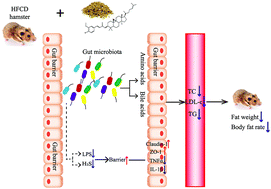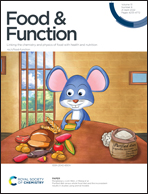Oryzanol alleviates high fat and cholesterol diet-induced hypercholesterolemia associated with the modulation of the gut microbiota in hamsters†
Abstract
A high fat and cholesterol diet (HFCD) can modulate the gut microbiota, which is closely related with hypercholesterolemia. This study aimed to explore the anti-hypercholesterolemia effect of oryzanol, and investigate whether the function of oryzanol is associated with the gut microbiota and related metabolites. 16S rRNA and ultrahigh-performance liquid chromatography-quadrupole time-of-flight mass spectrometry were applied for the gut microbiota and untargeted metabolomics, respectively. The results showed that HFCD significantly upregulated body fat accumulation and serum lipids, including triglyceride, total cholesterol, low density lipoprotein cholesterol (LDL-c), high density lipoprotein cholesterol (HDL-c), and ratio of LDL-c/HDL-c, which induced hypercholesterolemia. Oryzanol supplementation decreased body fat accumulation and serum lipids, especially the LDL-c concentration and LDL-c/HDL-c ratio. In addition, the abundances of Desulfovibrio, Colidextribacter, norank_f__Oscillospiraceae, unclassified_f__Erysipelotrichaceae, unclassified_f__Oscillospiraceae, norank_f__Peptococcaceae, Oscillibacter, Bilophila and Harryflintia were increased and the abundance of norank_f__Muribaculaceae was decreased in HFCD-induced hyperlipidemia hamsters. Metabolites were changed after HFCD treatment and 9 differential metabolites belonged to bile acids and 8 differential metabolites belonged to amino acids. Those genera and metabolites were significantly associated with serum lipids. HFCD also disrupted the intestinal barrier. Oryzanol supplementation reversed the changes of the gut microbiota and metabolites, and intestinal barrier injury was also partly relieved. This suggests that oryzanol supplementation modulating the gut microbiota contributes to its anti-hyperlipidemia function, especially anti-hypercholesterolemia.



 Please wait while we load your content...
Please wait while we load your content...